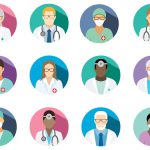Ben Reynolds, PA-C, MSPAS, DFAAPA, chief advanced practice officer at UPMC, was selected as a Presidential Leadership Scholar, one of the first advance practice providers to ever be chosen.
Each year, the Presidential Leadership Scholars program selects professionals from all disciplines across the country to participate in a six-month course on advanced leadership skills. Out of thousands of applicants, only 60 are accepted.
“It’s an honor to be selected,” Reynolds said. “The other scholars are brilliant, engaging and open to discussing diverse viewpoints to find common ground.”
Participants will study the experiences of Presidents George W. Bush, Bill Clinton, George H.W. Bush and Lyndon B. Johnson to develop their leadership and diplomatic skills. Former presidents, past and current presidential cabinet members, as well as experts in a variety of fields, will participate in the program.
Participants are expected to use their newfound skills to create or further an initiative that helps their community. Reynolds intends to focus on fighting the growing opioid epidemic in the communities that he and UPMC serve.
“I’ve always been very passionate about opioid use disorder and the problems that prescription opioids have played in this crisis,” he said. “Low back pain has been commonly cited as a gateway condition to prescription opioid disorder. In partnership with the Pitt School of Health and Rehabilitation Sciences, we’ve been developing evidence-based tools to treat these patients with non-opioid alternatives. I hope to use these skills and the connections I’ll make in the Presidential Leadership Scholars to further this initiative.”
Reynolds also sees this experience as beneficial to more than just his patients and his team.
“I think it’s important for UPMC to have a health care leader on this list because it speaks to how seriously we take the effect of leadership on the provision of high-quality patient care,” he continued. “As the largest employer in Pennsylvania, we also take seriously the quality of leadership that we are providing in all our interactions outside of the health care setting. Never has that been more important than during the pandemic.”









